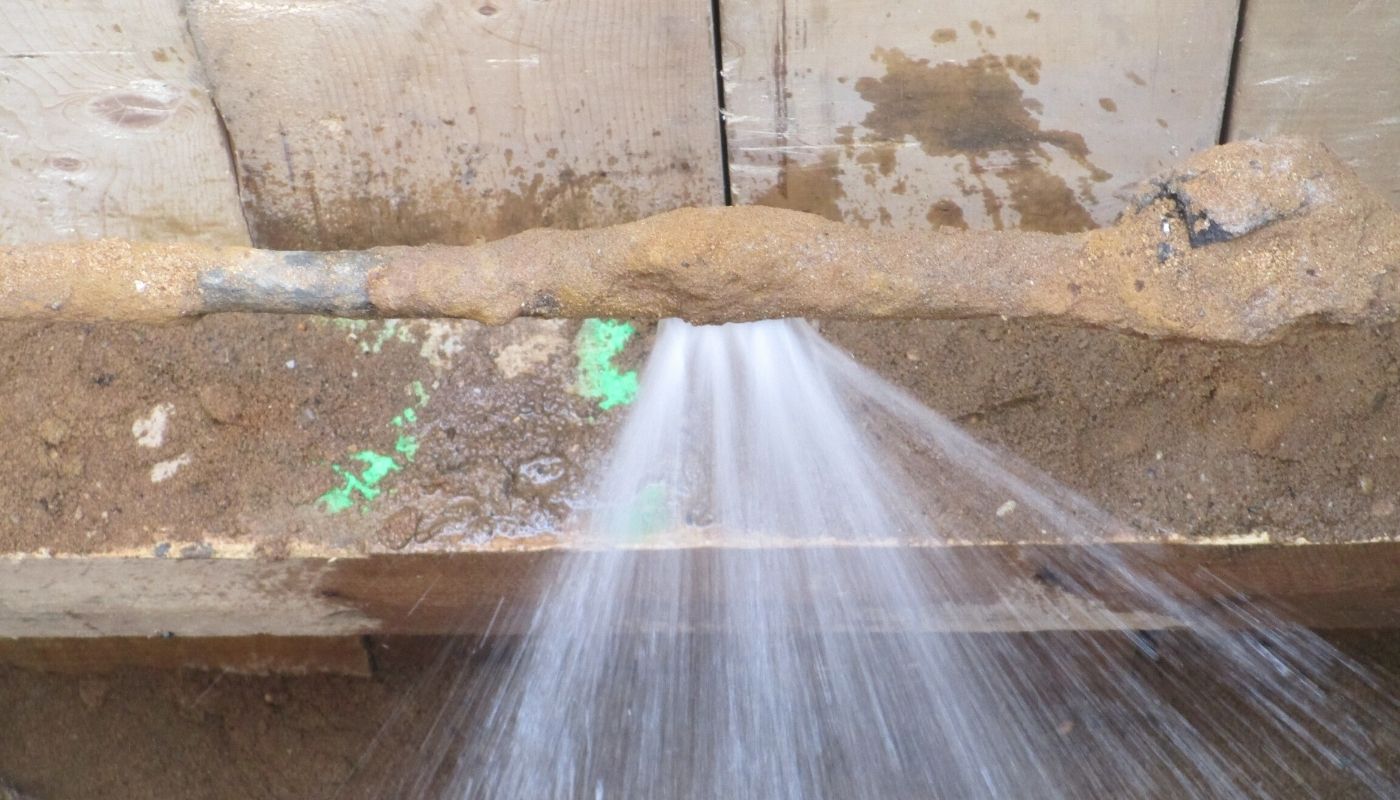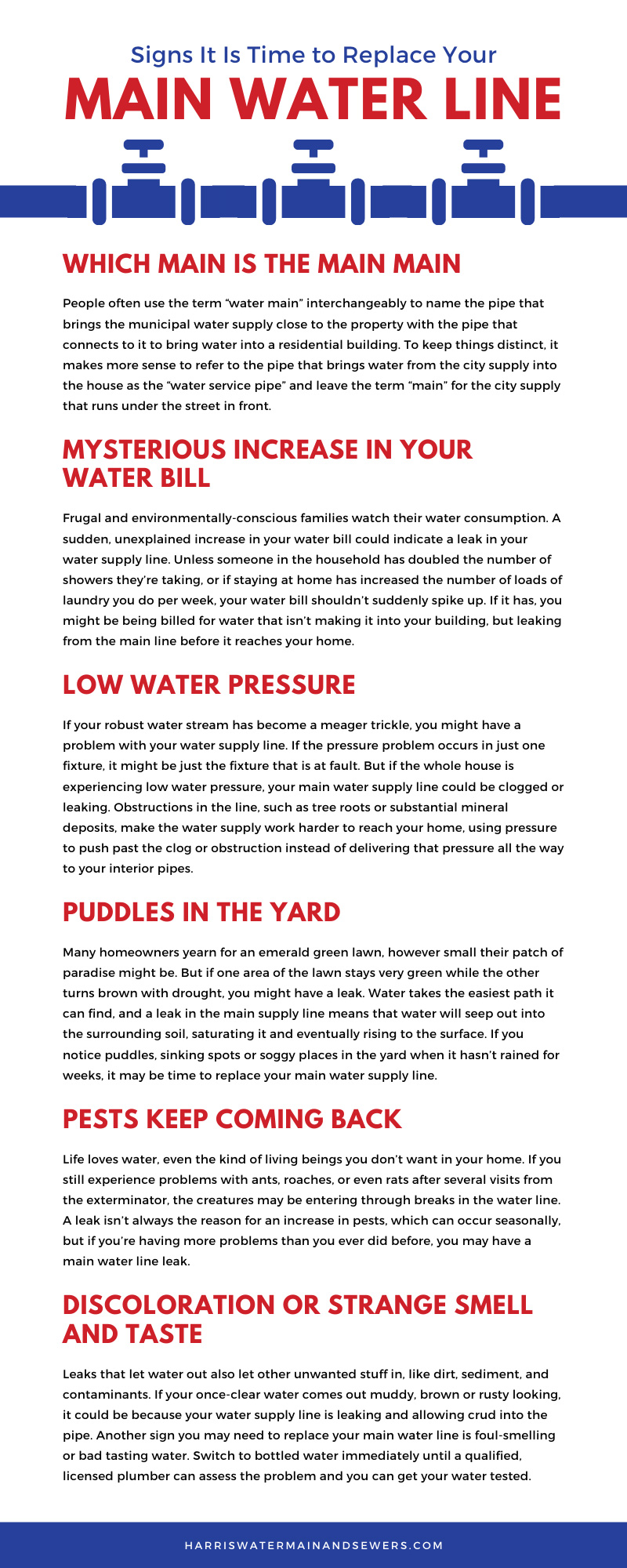No homeowner likes to contemplate the possibility of major repairs. However, most also realize that ignoring problems only makes them worse. We often take running water for granted, without thinking about the main line that brings water from the city connection into our home. Homeowners are responsible for maintaining the water lines that run under their property. In most locations, they are responsible for the line all the way up to the connection to the city water main, which is known as the tap connection. That is why it is important to keep an eye out for signs it is time to replace your main water line.
Water Service Pipe vs. Water Main
People often use the term “water main” interchangeably to name the pipe that brings the municipal water supply close to the property, and the pipe that connects to the main water supply to bring water into a residential building. To keep things distinct, it makes more sense to refer to the pipe that brings water from the city supply into the house as the “water service pipe” and leave the term “main” for the city supply that runs under the street in front of the home. If the water service pipe is leaking, damaged, or broken, the homeowner is responsible for fixing it. Knowing the signs of a main water line that needs replacement is critical to maintaining a safe and healthy water supply for your home.
Mysterious Increase in Your Water Bill
Frugal and environmentally-conscious families watch their water consumption. A sudden, unexplained increase in your water bill could indicate a leak inside your home. If you are doing the same amount of laundry and no one in the home is suddenly taking three more showers a day, but your bill is soaring anyway, something might be wrong.
Occasionally, however, a leak inside the home leads to the discovery of a problem with the water service pipe that brings the water supply from the tap on the city main into the home. While most indoor leaks won’t require an exterior repair on a water service pipe, sometimes a property owner who has identified a leaking pipe inside the basement near the meter simultaneously discovers that the old water main running out to the street is made of lead, or possibly even leaking as well. In this case, the entire main line must be replaced from the internal leak to the city main in the street.
Low Water Pressure
If your robust water stream has turned into a meager trickle, you might have a problem with your water supply line. If the pressure problem occurs in just one fixture, it might be just the fixture that is at fault. But if the whole house is experiencing low water pressure, your main water supply line could be clogged or leaking. Obstructions in the line, such as debris or substantial mineral deposits, make the water supply work harder to reach your home. A clogged or obstructed line uses up pressure to push past the obstruction instead of delivering that pressure all the way to your interior pipes. It is also important to check the size of your connection to the city main, as this is a common reason for low water pressure. A licensed plumber can help identify what could be causing the pressure problem.
What If It Isn’t Your Pipe
In densely populated areas where homes share walls or are very close together, someone else’s leak could be causing problems for you. If you notice some signs of water main problems like puddles in the yard or water burbling out through cracks in the sidewalk or street, yet everything inside the house seems fine, it might be a neighbor’s pipe that is leaking. Call the city’s water department and contact a licensed plumber who can help you locate the source of the leak.
Other Underground Pipe Problems
The water service pipe isn’t the only pipe that runs underground from your home and attaches to a city fixture – your sewer pipe carries wastewater away from your home to the city sewer line. Like water pipes, your sewer pipes can become obstructed, leak, or even break.
When a sewer line breaks, it creates a potential health hazard and must be dealt with right away. Sewer line breaks may cause puddles in the yard, soggy or soft places, or a noticeable increase in pests around the home and yard, as well as foul odors. As with water service pipes, the homeowner is responsible for the repair and maintenance of sewer pipes from the home to the connection with the city sewer. The most obvious sign of a problem with the sewer line is a water backup into your home. Usually, these backups happen in the lowest level of the home, but sometimes the sewer line can back up all the way to drains in the upper levels. Contact a plumber that specializes in sewer and water line repair to identify the problem and perform repairs.
Different municipalities have different rules about pipe repair and replacement. In New York City, old pipes may be made of materials that are no longer permitted for water pipes, like lead. If your plumber determines you have a lead main water supply line, the entire line must be replaced. It is unlawful for a plumber in New York to repair a lead water pipe.
Other rules may apply to just how much of the line the homeowner must maintain. Usually, the city will deal only with their own main, and the homeowner will have to maintain, repair, or replace their supply line all the way to and including the connection with the city main, even if the water service line runs beyond the homeowner’s property line.
Line replacement can involve digging deep into yards and drilling out concrete in streets or sidewalks to get at the problem and resolve it. Make sure your professional, licensed plumbing contractor can explain all that is involved in a main water supply line replacement, from permits to notices, as well as important information including who is responsible for repairing roadways and sidewalks that had to be dug out to reach the pipe in need of replacement.
Major repairs in New York City require a comprehensive understanding of city rules and codes for water service repairs. Some water problems may be deemed emergencies, requiring fast action and a contractor who is experienced in and licensed to do underground work.
If you notice signs of a water main supply line leak, call a plumber experienced with broken water main repair right away. You may be able to limit the damage and replace a section of pipe, rather than the whole thing, unless your pipe is badly compromised or made of prohibited materials.






















